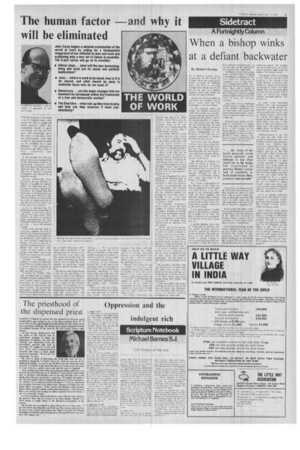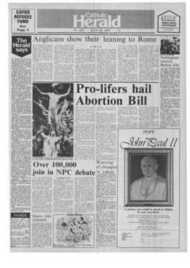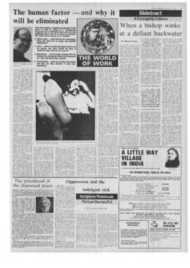Page 5, 13th July 1979
Page 5

Report an error
Noticed an error on this page?If you've noticed an error in this article please click here to report it.
Tags
Share
Related articles
Arms, Racism And Unions Put On Npc Agenda
Defence Of Ncp
Kevin Mayhew On The Great Divide
Papers To Be Published
North's Quieter Approach To The Faith
Sidetract
A Fortnightly Column
When a bishop winks at a defiant backwater
By Richard Dovvden
IN A SMALL country parish somewhere in the South of England where the parish priest knows everyone by christian name and there is not quite enough room outside the Church for all the cars on a Sunday morning, priest and people are defying the rules of Rome.
As they are in many parishes up and down the country, and in many cases with the full knowledge of the local bishop.
In this particular parish the people are offered communion under both kinds every Sunday. Everyone queues up to take communion from the priest or one of the special ministers of communion, then steps to the side, takes the cup from the altar and wets the upper lip with the blood of Christ. This is forbidden by the Sacred Congregation for the Doctrine of the Faith but it is regularly performed in parishes up and down the country.
There have been live changes in Rome's rules on receiving cornmunion under both kinds in the last few years. Each one more liberal than the last, allowing it on more and more occasions. Everyone knows it will soon be allowed at all masses.
The Bishops of England and Wales are about to produce a guidance document for priests encouraging them to make use of the new opportunities but at present, although the rule is complex, it still forbids communion under both kinds at all masses on Sundays.
The Sacred Congregation for the Doctrine of the Faith, the Vatican department which deals with such matters, is run by a group of men renowned worldwide for their legalistic and inflexible interpretations of documents and so if any practice such as this comes to their notice they send a sharp reminder of the rules to the local bishop.
It only needs a similar minded person in the parish or a wandering journalist to tell them and then, no question or consultation with the man on the spot. a ukase goes out.
A similar disparity exists over the Third Rite of Penance: the rite which includes general absolution instead of individual private confession. The rules say that it is only allowed if the number of people wanting to receive absolution from their sins is too great to allow the priest to hear confession properly and if, as a result, they will be deprived of the eucharist for a long time.
Archbishop Dwyer took up the matter with the Vatican on behalf of the Bishops Conference in 1977 and asked for definitions of "properly" and "a long time". The Congregation didn't offer definitions hut the following year Pope Paul told a group of American bishops that the Third Rite of Penance was not a normal pastoral option and was only to he used in cases of extreme necessity.
Again there was no definition offered but the message was that in the northern hemisphere, for the most part well served with priests and transport, there was no need for priests to have recourse to this rite.
However many priests and the national conference of priests want to be able to use the Third Rite, if not instead of the traditional rite, at least as a way of getting people to come to confess privately. Some bishops are known to agree with them but will not openly defy the Vatican.
Where priests go ahead and use the Third Rite some bishops turn their croziers the other way and don't wish to know, others say, "tell me but don't let anyone else know." It rather rules out the large gatherings which the Third Rite of Penance is designed for.
In these cases the vision of the local pastoral needs forces priests and bishops, to use rites which are in the books but restricted in. practice. Rome's severe lack of sensitivity to local needs forces these practices underground.
At one parish in a large city the whole congregation is invited to say the Canon with the priest, including the words of consecration. When they were mildly challenged by the bishop the parish priest explained without flinchina that it was a very
traditional parish, the practice was all of three years old and to stop it suddenly might upset the faithful. The bishop winked.
The attitude of the local bishop is very important and even more important is the attitude of the whole bishops' conference. Our bishops are mixed and not always consistently in favour of sensible change. Recently they were asked to query the ban on altar girls in Rome but instead they simply publicly reiterated Rome's own prohibition.
In other cases individual bishops have not encouraged recalcitrant parish priests to implement some of the new rites such as communion in the hand or the kiss of peace. Presumably the plaints and rights of the people are less powerful than the parish priest who digs in. But there are also more serious areas where only a few priests go and which almost no bishop would even privately venture.
Intercommunion is one. The law says that only under very special circumstances may nonCatholics receive communion at a. Catholic mass. Catholics may never take communion at a nonCatholic eucharist. but "mixed bathing" does go on. The rules which conflict most strongly with the mercy most would expect from the Church are those which forbid the sacraments to those invalidly married or irregularly married. It is a topic which the National Pastoral Congress has unexpectedly brought up and a deeply buried feeling is emerging that the rules which forbid the sacraments for life to a person who made a marriage mistake at 19, are too harsh for today's Church. Again some priests seeing the pastoral need and the high lapsation rate which is caused by this rule. simply set it aside.
So far our bishops' publicised negotiations with Rome on these liturgical and pastoral matters have been polite and dererential. The strength of their private efforts remains a secret.
Most bishops when asked simply shrug their shoulders and hope for a change with the arrival of Pope John Paul II who has pledged himself to a more collegial approach to his bishops. The test of collegiality and his ability to deal with his own Vatican bureacracy will come when a bishops' conference presents him with a practice one of the congregations doesn't approve of. That is if they have the courage to say what is actually going on.
blog comments powered by Disqus











